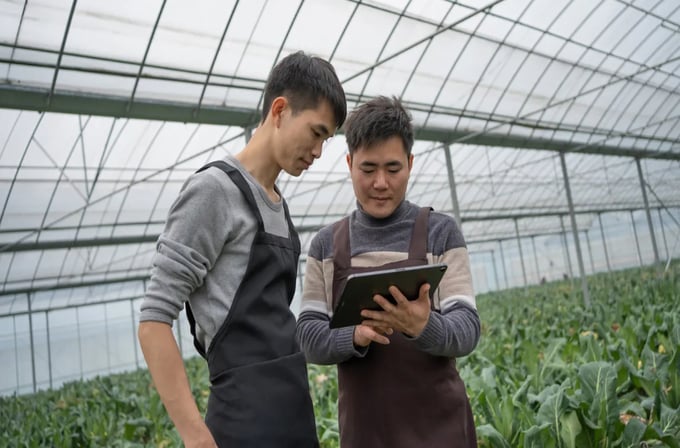November 26, 2025 | 23:26 GMT +7
November 26, 2025 | 23:26 GMT +7
Hotline: 0913.378.918
November 26, 2025 | 23:26 GMT +7
Hotline: 0913.378.918

Stock image of farm workers recording vegetable growth data in China. Photo: Wengen Ling
A new and innovative approach utilized by soil scientists from the Chinese Academy of Agricultural Sciences has helped turn huge swathes of salty soil into fertile farmlands. The experiments were attempted in the Wuyuan county region in the Inner Mongolia region of China.
As per estimates of the United Nations Food and Agriculture Organization (FAO), as much as nine percent of Earth’s landmass is salinized and unsuitable for agriculture in its present form. While natural conditions such as desert-like conditions can lead to degradation in soil quality, human activities have also contributed to these changes.
Poor water management is one causative factor for increased soil salinity. In Wuyuan, China, farmers over-irrigate their lands with abundant water from the nearby Yellow Sea. This increases the water table in the region, resulting in the soil salts migrating upwards.
The arid region receives very little rainfall, and the salt content of the soil is not diluted, resulting in a build-up of salts.
A team of soil scientists led by Li Yuyi devised an innovative approach to tackle the increasing salinity. The researchers used crop stalks of lengths varying between two to six inches (5-15 cm) and buried them flat into the soil at a depth of about one foot (30-40 cm).
The ground above was then covered with a plastic sheet to help retain moisture. The crop stalks prevented the salts from rising to the surface. Aided by moisture retention, the team reduced the soil’s salt content by as much as 36 percent on average. The decreased salinity resulted in a 30.5 percent increase in yield, as per data released by Science and Technology Daily, a government outlet.
With a population of 1.4 billion, food security is a priority sector for China. However, the country faces multiple challenges since it ranks third globally regarding saline-alkaline lands within its geographical boundaries.
Two hundred forty-seven million acres of Chinese mainland have high salinity, most of which occur in central and western China’s arid and semi-arid regions. According to government estimates, a third of this land can be returned to use following intervention with technology or improving farming practices.
Nevertheless, China achieved a bumper harvest in 2023, and officials intend to keep grain output over 650 million tonnes to ensure self-sufficiency in the face of climate change and uncertainties in global food markets.
To achieve this consistently, China has developed about 40 technologies to treat saline soil and make it fit for agriculture again. The country is also keen to share this technology with other countries through its Belt and Road Initiative.
Further to prepare itself, China is also working with countries like Italy, Japan, South Korea, and the US to introduce rice seeds with salt-tolerant genes, the South China Morning Post added in its report.
Teams such as one from the Chinese Academy of Agricultural Sciences have spent more than a decade researching saline-alkaline soils in the country and have developed interventions tailored specifically to local conditions.
(interestingengineering)

(VAN) A new study reveals how the simultaneous effects of ocean acidification, salinity and loss of oxygen are making the world more fragile.

(VAN) Hopes are growing that the creation of the first 3D turkey gut model could be a turning point in the battle against the virulent blackhead disease.

(VAN) Tyson, America’s biggest meat supplier, plans to shutter one of its largest beef processing plants as the industry continues to struggle with low cattle supplies and political pressure from Washington.

(VAN) New FAO study shows how digital solutions are empowering farmers and fishers to prevent losses and build resilient agrifood systems.

(VAN) Brazil's COP30 presidency pushed through a compromise climate deal on Saturday that would boost finance for poor nations coping with global warming but that omitted any mention of the fossil fuels driving it.

(VAN) Poultry farmers in the UK have been warned that they could face one of the worst winters yet for bird flu.

(VAN) Prices of main-crop paddy have risen sharply, with jasmine rice hitting 16,100 baht per tonne — the highest level in years.